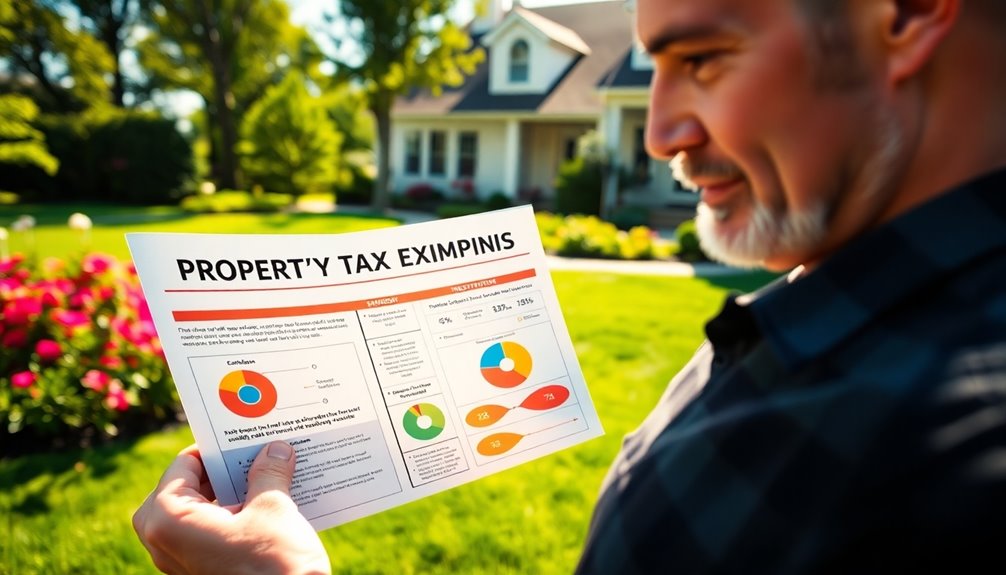To lower your property taxes in Michigan, start by understanding your property's assessed value and exploring available exemptions like the Homestead Property Tax Credit and the Poverty Exemption. Check if you qualify for the Veteran's Property Tax Exemption or the Homeowners Property Exemption (HOPE), as these can offer significant relief. You can also appeal your assessment if you believe it's inaccurate, which involves contacting your local Board of Review. Finally, consider the summer property tax deferment to manage financial burdens. There's plenty more to uncover that can help you maximize your savings.
Key Takeaways
- Review your property assessment for accuracy and compare it to recent sales of similar properties in your area.
- File an appeal with the local Board of Review if you believe your assessed value is too high.
- Apply for property tax exemptions such as the Homestead Property Tax Credit or Poverty Exemption if you qualify.
- Utilize the Summer Property Tax Deferment program to postpone tax payments without penalties if experiencing financial hardship.
- Keep track of millage rates and ensure you understand how they affect your overall property tax liability.
Understanding Property Tax Basics

Understanding property tax basics is crucial for homeowners in Michigan who want to manage their expenses effectively. The assessed value of your property is typically set at 50% of its market value, which reflects the price it would likely sell for under normal conditions.
Local assessors evaluate homes based on recent sales of similar properties, size, condition, and any improvements you've made. This assessed value forms the foundation for your tax calculations. Property location affects tax rates; each area has different millage rates.
To calculate your property taxes, you'll use your assessed value and your local millage rate, expressed in mills. One mill equals $1 in taxes for every $1,000 of assessed value.
The formula is simple: (Assessed Value / 1,000) X Millage Rate = Property Taxes. Local governments determine these rates to fund essential services like schools and public safety, which means they can vary by location.
Exploring Property Tax Exemptions

Property tax exemptions can significantly reduce your tax burden as a Michigan homeowner. Various exemptions cater to specific groups, such as disabled veterans.
If you're a disabled veteran or the unremarried surviving spouse of one, you might qualify for an exemption on your homestead property. The U.S. Department of Veterans Affairs needs to confirm your disability status.
You can also benefit from housing-related exemptions. For instance, the Attainable Housing Exemption offers tax incentives for rental properties with up to four units, aiding in renovations and new constructions.
Non-profit supportive housing properties may also qualify for an exemption.
If you're focused on environmentally friendly initiatives, consider the Air and Water Pollution Control Exemptions or the Solar Energy Facility Exemption. These can help reduce taxes for facilities that manage pollution or generate solar energy.
Lastly, the Homestead Property Tax Credit is available if your household income is below a certain threshold. This credit can significantly ease your tax burden. Additionally, understanding the various exemptions available is crucial for maximizing your savings as a homeowner.
Take the time to explore these exemptions and see how they can benefit your financial situation as a Michigan homeowner.
Poverty Exemption Details

A poverty exemption can provide significant tax relief for eligible homeowners in Michigan, helping to alleviate the financial burden of property taxes. To qualify, you must live in your principal residence and meet specific income and asset criteria set by your township. Each municipality has different thresholds, so be sure to check locally. Additionally, annual application is required for the exemption.
To apply, obtain the application form from your local assessor or their website. Complete the form thoroughly, marking "N/A" for any questions that don't apply to you. You'll need to attach supporting documents, like copies of your federal income tax return, and submit everything to the local assessor.
Remember, you need to file this application annually.
After submission, the Board of Review will make a determination, which may take some time. If granted, you'll receive a letter detailing your exemption amount and adjusted property tax. If denied, you can appeal to the Michigan Tax Tribunal within the required deadlines. Be sure to submit any necessary documents 21 days before your hearing.
Utilizing this exemption can significantly reduce your property taxes, improving housing affordability and stability for you and your family.
Veteran's Property Tax Exemption

Many Michigan veterans may qualify for a property tax exemption that can significantly ease their financial burden.
To be eligible, you must be a resident of Michigan, discharged honorably from the U.S. Armed Forces, and permanently and totally disabled due to your military service. You might also qualify if you have a certificate from the U.S. Department of Veterans Affairs for pecuniary assistance or if you're rated as individually unemployable. Additionally, a rating of individually unemployable by the VA also qualifies you for this exemption.
To apply, file Form 5107, *Affidavit for Disabled Veterans Exemption*, with your local Assessing Department before December 31 of the year you want the exemption. You'll need official documentation from the VA.
Remember, until 2026, you'll need to apply annually; after that, your exemption will stay in place unless you rescind it.
This exemption applies to your homestead property, benefiting both you and your unremarried surviving spouse.
If your situation changes and you no longer qualify, use Form 6054 to rescind the exemption. If denied, you can appeal the decision to the local Board of Review and then to the Michigan Tax Tribunal within 35 days.
Homeowners Property Exemption (HOPE)

For homeowners in Michigan seeking relief from property taxes, the Homeowners Property Exemption (HOPE) program offers significant benefits. To qualify, you must own and occupy your home as your primary residence. Eligibility is determined by household income and specific circumstances, so it's crucial to check your situation.
Additionally, homeowners can benefit from the MI-HOPE Program, which provides energy-efficiency residential repairs to those facing financial hardship.
Remember, you need to apply annually, and the Board of Review will grant approval based on your application. If approved, you could be exempt from current year property taxes, with exemptions ranging from 10% to 100% for those at risk of tax foreclosure.
However, you'll still need to pay certain fees, like the solid waste fee, which is discounted to $120 for HOPE-approved homeowners. The program aims to enhance housing affordability and prevent foreclosure, making it a vital resource for many.
Additionally, the Pay As You Stay (PAYS) program can help further by reducing unpaid delinquent taxes and allowing you to pay the balance over three years at zero percent interest.
If you need help with your HOPE application, various resources are available, including the Quicken Loans Community Fund and the Wayne County Treasurer's Office.
Summer Property Tax Deferment

Summer property tax deferment offers a practical solution for those facing financial challenges, allowing you to postpone your tax payments without incurring penalties or interest. To qualify, you must meet specific eligibility requirements set by the General Property Tax Act. The key is to file your application with your city or township treasurer by the designated deadline. For summer taxes, this means submitting your intent to defer by September 15 or the normal due date.
Once approved, you won't have to worry about additional penalties or interest, as long as you pay the deferred taxes by the new deadline provided by the treasurer. This program helps you manage your finances by giving you temporary relief from immediate tax obligations. Additionally, many seniors may benefit from financial aid programs that assist with housing costs.
Remember, you need to submit the deferment form, like Form 471, each year to continue benefiting from the program. Your local treasurer's office will handle the application and approval process, ensuring you receive a statement outlining the taxes deferred. Stay informed about eligibility requirements and deadlines to make the most of this opportunity and ease your financial burden.
Calculating Taxable Value and Millage Rate

Understanding how to calculate taxable value and millage rates is crucial for managing your property taxes in Michigan. Your Taxable Value (TV) determines how much you'll owe. It's calculated using the Capped Value formula: Prior Taxable Value minus Taxable Value of Losses, plus the lesser of 5% or the CPI multiplier, and plus Taxable Value of Additions. The CPI reflects inflation and is updated each fall.
Remember, Assessed Value (AV) is typically 50% of your property's market value and can be adjusted by local equalization. TV usually stays lower than AV, but if you sell your property, your TV becomes uncapped and matches the AV for the next tax year. Taxable value increases are capped at the inflation rate or 5% annually, which can help you plan for future tax obligations.
Millage rates are the tax rates used to compute your local property taxes. One mill equals $1 per $1,000 of taxable value. To find your property tax liability, multiply your TV by the millage rate and divide by 1,000.
You can find millage rates on your property tax statement or your local assessor's office. Understanding these calculations can empower you to manage and potentially lower your property tax burden.
Appealing Property Assessments

Reviewing your property's tax assessment is a vital step in managing your property taxes in Michigan, especially if you believe your assessed value is too high.
You'll receive a Notice of Assessment in February that outlines your property's assessed value, which should be 50% of its true cash value. Start by checking for any discrepancies or errors, like incorrect features listed on the assessment.
Next, determine if you need to appeal. Compare the assessed value with the actual market value and consider any significant changes in your property or neighborhood. Make sure your assessment aligns with similar properties around you and note any structural defects that might lower your property's value. It's also important to verify the accuracy of your assessed value against the current market conditions to identify any discrepancies that warrant further investigation.
Once you decide to appeal, gather the necessary documents. Obtain an appraisal or market analysis, and collect records of sales comparisons and any neighborhood changes.
Schedule an appointment with your local Board of Review in March, fill out an appeal petition, and, if needed, escalate to the Michigan Tax Tribunal by the appropriate deadlines.
Remember to file your personal property statement by February 20 if going directly to the tribunal.
Frequently Asked Questions
What Documents Are Needed to Apply for Property Tax Exemptions?
To apply for property tax exemptions, you'll need specific documents.
Start with ownership proof like a deed or land contract. If you're claiming a poverty exemption, complete the necessary forms and provide income proof for all household members.
For disabled veterans, submit the affidavit and discharge documentation. Nonprofit organizations should include articles of incorporation and IRS status.
Ensure you have all required forms and proof ready to streamline the application process.
How Often Can I Appeal My Property Assessment?
You can appeal your property assessment annually, but there are specific rules to follow.
If you receive an assessment notice every February, you've got a window to appeal between February 1 and February 22 for that year.
If your appeal gets denied, you can't appeal again for the same year; you'll need to wait until the next assessment.
Each appeal stage must be completed before moving on to the next, so stay organized!
Can I Qualify for Multiple Property Tax Exemptions Simultaneously?
Yes, you can qualify for multiple property tax exemptions simultaneously in Michigan, but there are specific rules.
For example, you can claim the Over 65 Exemption and the Disabled Person's Exemption in the same year, but not on the same taxing entity.
You'll need to meet the criteria for each exemption and file the necessary applications.
Make sure you stay on top of deadlines to maximize your benefits!
Are There Deadlines for Applying for Property Tax Exemptions?
Yes, there are deadlines for applying for property tax exemptions.
For the Principal Residence Exemption, you must submit Form 2368 by June 1 for summer taxes and November 1 for winter taxes.
Poverty exemption applications need to be filed after January 1, before the Board of Review.
For the Homeowners Property Exemption, you should apply by 4:30 P.M. on November 7, 2025.
Keep track of these dates to ensure you don't miss out!
How Do Local Taxes Differ From State Property Taxes in Michigan?
Local taxes in Michigan primarily come from property taxes, which are based on a home's taxable value and local millage rates.
Unlike state property taxes, local taxes can vary significantly by county due to differing fiscal priorities and community needs.
Local governments set these rates to fund public services, while state property taxes are more standardized and often support broader initiatives.
You'll notice these variations affect how much you pay depending on where you live.
Conclusion
Lowering your property taxes in Michigan is definitely achievable with the right strategies. By understanding exemptions like the Homeowners Property Exemption and taking advantage of programs for veterans and those facing financial hardships, you can significantly reduce your tax burden. Don't forget to regularly review your property assessments and consider appealing if you believe they're inaccurate. With these steps, you'll be better equipped to manage your property taxes and keep more money in your pocket.









